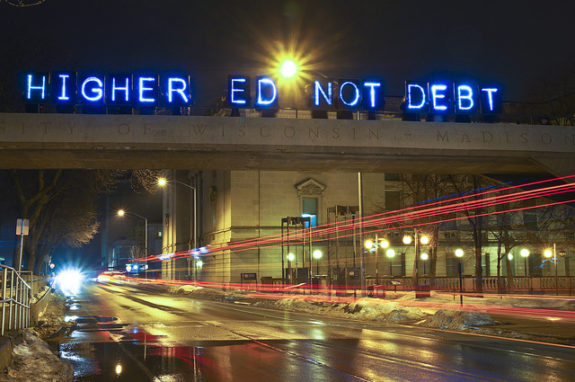
April 1, 2017; New York Times and Forbes
Four former students have brought suit in federal court against the U.S. Department of Education seeking to reinstate their eligibility under the federal Student Loan Forgiveness Program. The former students claim that FedLoan Servicing, which administers the program for the Education Department, issued approval letters that were then rescinded with little or no opportunity to appeal the decision. The Education Department said in a court filing that borrowers should not necessarily rely on the approval letters they receive from FedLoan because they are not binding and may be rescinded at any time.
The program, started in 2007, offered forgiveness for student loan obligations to students with government (not private) student loans who work in public service for 10 years and maintain their student loan payments during that time. About 550,000 students have signed up for the program, which offers forgiveness for borrowers who choose to work for government agencies, public schools, public hospitals, and 501(c)(3) and some other nonprofit organizations. The federal Consumer Financial Protection Bureau estimates that 25 percent of the U.S. workforce is employed in public service and could be eligible to participate in “some form of student loan forgiveness, including the Public Service Loan Forgiveness program.”
Lawsuit plaintiff Jamie Rudert applied for and received confirmation in 2012 that his work as an attorney for the Vietnam Veterans of America (VVA) qualified him for the program. However, when he sent in the routine annual recertification in 2016, he was told by FedLoan that not only was it denied, but that none of his previous work for the nonprofit would be recognized as qualifying. FedLoan told him that his initial application was approved in error, but there was no explanation of what the error may have been or how it may have occurred.
Sign up for our free newsletters
Subscribe to NPQ's newsletters to have our top stories delivered directly to your inbox.
By signing up, you agree to our privacy policy and terms of use, and to receive messages from NPQ and our partners.
A review of VVA’s GuideStar page and Form 990 shows that VVA isn’t a 501(c)(3) public charity, but a 501(c)(19) veterans organization. Technically, employment by a nonprofit that isn’t a 501(c)(3) may still fit under the program if the organization provides “qualifying public services,” such as law enforcement, emergency management, and public service for the elderly or individuals with disabilities.
The timing of the lawsuit is especially important because, though the program was instituted in 2007, decisions on the first student loans to actually be forgiven won’t happen until October. In fact, the paperwork design hasn’t been completed for the forms a borrower would use to actually apply for loan forgiveness at the end of his or her 10-year period in the program.
Anyone currently employed or seeking employment in organizations that would qualify for the loan forgiveness program is encouraged to confirm that eligibility. While the circumstances of the four plaintiffs in the federal lawsuit are unique (e.g., is the VVA as a 501(c)(19) providing qualifying public services as defined in the loan forgiveness program?), it’s important for all borrowers to be aware of the qualifications and, if necessary, change their employment to maintain their program eligibility. Nonprofit organizations, whether 501(c)(3) organizations or those recognized under different IRS code provisions, would be well advised to confirm that they qualify as eligible employers under the program and keep their employees updated.—Michael Wyland













